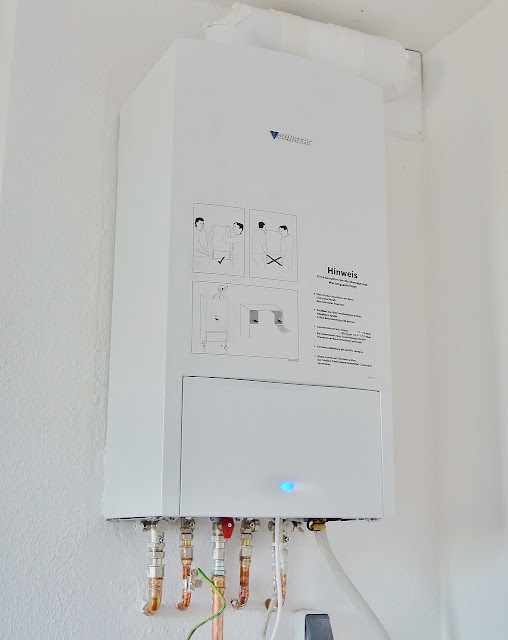In the realm of modern living, water heaters play an essential role, providing the luxury of hot water for our showers, dishwashers, and washing machines. However, traditional water heaters tend to be major contributors to energy inefficiency and greenhouse gas emissions, highlighting an urgent need for a greener alternative.
According to the U.S. Department of Energy, water heating represents about 18% of household energy consumption, making it the second largest energy expenditure in homes after heating and cooling. As we collectively work towards adopting more sustainable living practices, evaluating and addressing the environmental impact of such routine appliances is crucial.
Fortunately, the rise of eco-friendly water heaters provides a promising solution. These innovative devices are designed to decrease our carbon footprint and promote sustainable living, all while maintaining the convenience of instant hot water.
Image by Ulrich Dregler from Pixabay
The Case for Eco-Friendly Water Heaters
The limitations of traditional water heaters highlight the benefits of eco-friendly alternatives. Water heating forms a large part of home energy consumption, so switching to a greener, more efficient system can significantly reduce your carbon footprint and contribute to sustainable living.
Eco-friendly water heaters, like solar or heat pump models, are highly efficient, minimizing energy waste and virtually eliminating greenhouse gas emissions. Despite higher initial costs, their energy efficiency leads to long-term savings, with some models using 50-60% less energy than standard heaters, providing considerable savings over the device's lifetime.
Furthermore, shifting to eco-friendly water heaters can reduce both indoor and outdoor pollutant release. Traditional gas heaters, for instance, can generate low-level carbon monoxide emissions, which electric heat pumps or solar heaters can avoid.
Types of Eco-Friendly Water Heaters
Eco-friendly water heaters vary in type, each having unique mechanisms and advantages.
- Solar Water Heaters Solar heaters use rooftop solar panels to convert sunlight into heat for water. While they significantly reduce energy costs, they require substantial upfront investment, ample sunlight, and potentially a backup system for cloudy days.
- Heat Pump Water Heaters Also known as hybrid heaters, these use electricity to transfer heat from air or ground to water, making them highly energy-efficient. However, they have higher upfront costs, specific installation requirements, and may require more maintenance.
- Tankless Water Heaters These heaters, providing on-demand hot water, eliminate standby heat loss associated with storage heaters. Despite offering continuous hot water and being energy efficient, they may struggle to supply multiple uses simultaneously.
- Condensing Water Heaters Condensing heaters capture heat from combustion process exhaust gases to heat water, proving highly efficient. They're best for homes with high water usage but may be costly to install and require regular maintenance.
Selecting the Right Eco-Friendly Water Heater for Your Home
Choosing an eco-friendly water heater depends on several factors specific to your needs and circumstances. Here are key considerations:
- Energy Efficiency: Check the heater's Energy Factor (EF) rating—the higher the EF, the better the efficiency.
- Fuel Type and Availability: Consider the fuel type (natural gas, electricity, solar) needed for the heater and its availability in your area.
- Size: The heater should be sized to meet your household's hot water needs, especially important for tankless types.
- Cost: Evaluate both upfront and long-term operating costs.
Consider your home's hot water demand, the number of residents, the appliances using hot water, and peak usage times. The local climate and availability of resources like natural gas or sufficient space for a heat pump can also influence the effectiveness of certain heaters.
Financial Aspects of Eco-Friendly Water Heaters
Switching to an eco-friendly water heater involves understanding its financial implications. Despite higher initial costs, which include the unit price and installation costs, these heaters often offer significant long-term savings due to their superior energy efficiency. This efficiency can lead to considerably lower energy bills over time.
Furthermore, financial incentives such as tax credits, rebates, or grants are often available from governments and utility companies to promote the switch to energy-efficient alternatives. Researching these incentives can help offset the initial costs and make eco-friendly heaters a more financially appealing choice.
Professional Installation and Maintenance of Eco-Friendly Water Heaters
Investing in an eco-friendly water heater is the initial step towards a greener lifestyle. However, proper installation and regular maintenance are vital to maximize its efficiency and lifespan.
Each eco-friendly water heater type has unique installation requirements. Professional installation ensures correct, safe, and optimal operation of the unit. Professionals can also offer advice on the best system for your home and any necessary modifications.
Regular maintenance, such as system cleaning, inspection, and component checks, extends the heater's lifespan, maintains efficiency, and prevents serious problems.
While some basic maintenance can be DIY, complex tasks, especially for solar and heat pump water heaters, should be handled by professionals. Regular professional maintenance can prevent costly repairs and ensure the system remains energy efficient.
Conclusion
Choosing an eco-friendly water heater is a significant step towards sustainable living. It's a choice that not only benefits your home and wallet but also contributes to a greener and more sustainable future for our planet.
As we move forward, embracing such sustainable solutions will be critical in creating a healthier and more responsible relationship with our environment. While the transition to using an eco-friendly water heater might require some initial investment and adjustment, the long-term benefits far outweigh these initial considerations. It's a choice that's not just good for you, but also great for our planet.
